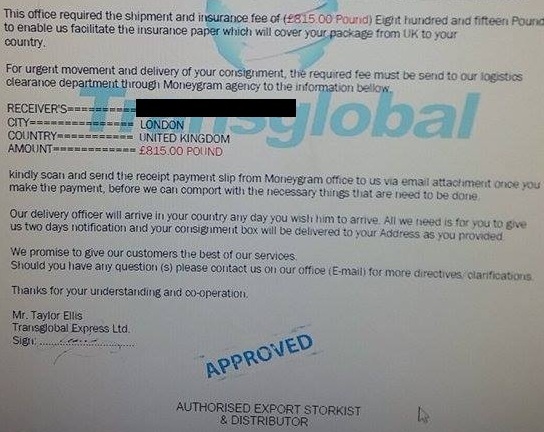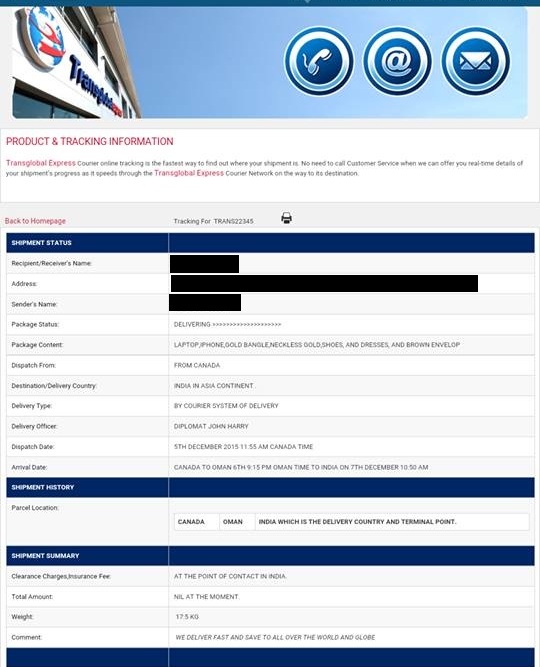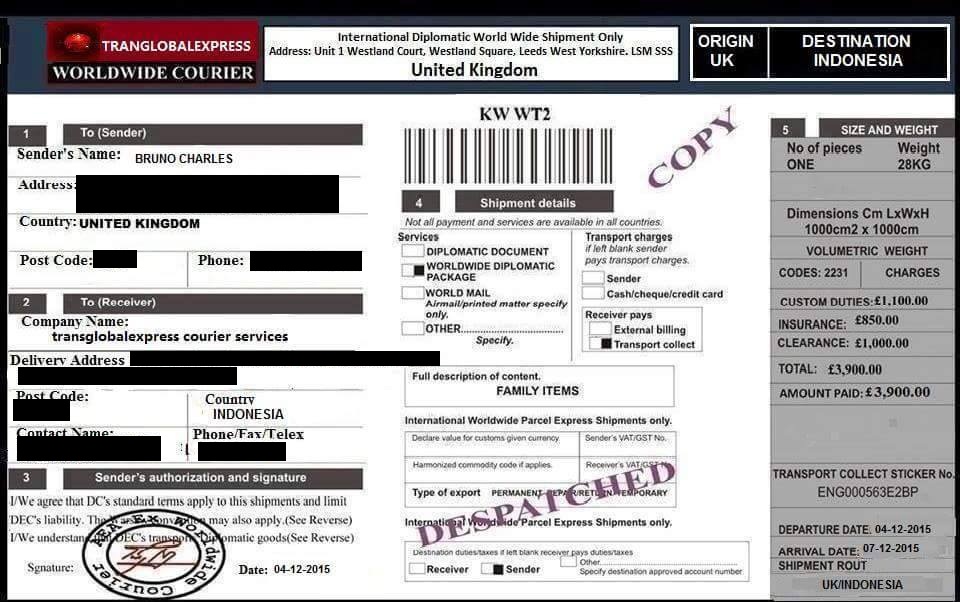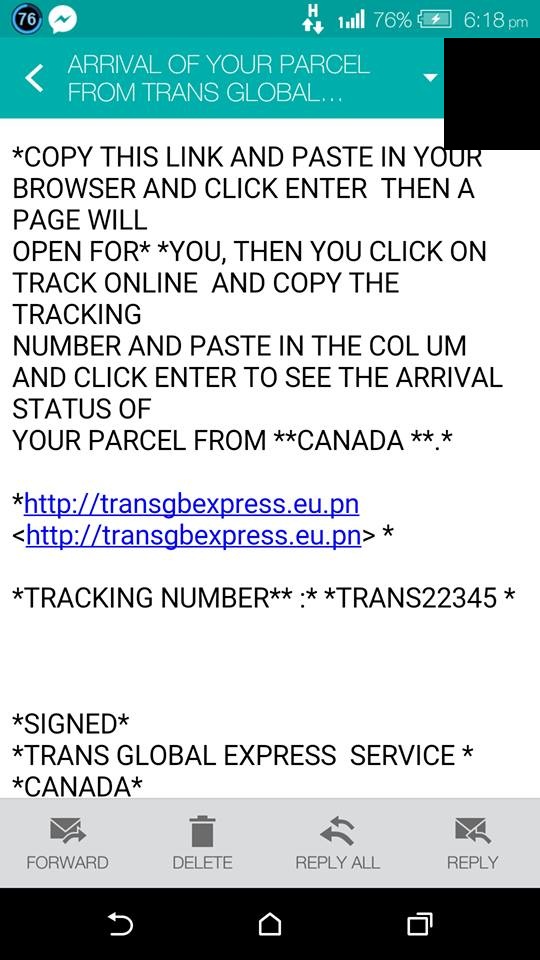Fraud
It’s an unfortunate reality of online life that businesses and customers are frequently subject to attempted fraud. Imposters often masquerade as legitimate businesses, including Transglobal Express, in attempt to scam people into sending money or downloading harmful viruses.
You can report fraud to us and we'll list it on our site to let others know. We will attempt to contact hosting providers to have fraud websites removed.
So how do you know if you’ve received a real email from us, or come across a genuine website? Please refer to our guide below.
Where can you find us?
Transglobal Express has offices in the UK and Germany only – we don’t have branches in Ghana, Indonesia or anywhere else.
These are our domains:
- https://www.transglobalexpress.co.uk
- https://www.transglobalexpress.de
We use a couple of other domains for surveys and marketing, but these two domains are the only ones we use for order notifications and customer service emails. For tracking links, we may also use https://tg.express.
Our contact details
You can view our Contact Us page for all of our contact details. If you come across anyone who claims to be us, you can cross-reference phone numbers and addresses with those listed here.
Our email addresses will always end with @transglobalexpress.co.uk (or .de for our German office). If you encounter any email addresses like [email protected], or those using a domain that looks similar to ours but is not quite the same, these will be fraudulent.
However, please note that sender addresses can be spoofed, to make it appear as if they are being sent from our official email addresses. It is possible to determine the real address by checking the email header. Alternatively, if this is too technical, you can get in touch with us directly to make sure.
What to watch out for
Fake websites
Fake websites
Scammers frequently put up websites that emulate our own to various degrees—sometimes stealing our logo, sometimes our page content, and even duplicating our website template. Please check the list of domains above to see which are legitimate.
Check URLs carefully as scammers will usually try to use tiny variations of legitimate URLs (for example, trnsglobalexpress.co.uk).
Attempted delivery text messages
Attempted delivery text messages
Sometimes fraudsters will mimic the notification texts sent out by legitimate carriers, claiming that a delivery attempt was made or an item is ready for collection. They'll then link you to their own website and ask for your details (see 'Malicious links and attachments' below), ostensibly for the purpose of tracking or rescheduling the delivery.
These can be quite convincing, so as a rule you should carefully check the sender number and URL before clicking the link in any messages of this type. Consider whether you are actually expecting a delivery and cross-check it with any orders you know you have made.
It's usually easier to spot a dodgy address in texts than in emails as they will show you the actual URL, but you can refer directly to the carrier in question if you're not sure.
Malicious links and attachments
Malicious links and attachments
If you ever receive an email or a text regarding an unknown parcel delivery—one you haven’t recently made yourself—we would strongly advise against clicking any of the links or opening any attachments. Please be aware that even an innocuous-looking .doc file may contain a malicious computer virus.
We will only ever send PDFs for shipment labels and invoices. We do not send .doc files or any other kind of file.
With email links, never simply trust the text that appears in the email, as this may be different from the real URL. You can check the real URL of links by hovering (but not clicking!) over them. If these links don’t use the official domain of the company (transglobalexpress.co.uk or .de), they are not legitimate. Texts should be easier to check as they will show the actual URL.
Requests for payment
Requests for payment
The most common type of text and email fraud that gets reported to us is the request for payment for international deliveries. Usually the sender claims that insurance or customs fees need to be paid by the recipient before the delivery can be completed.
We strongly advise against ever sending money, supplying personal details, or making payments by Western Union in response to these kinds of message. If you are in doubt about an email or text purporting to be from Transglobal Express, please contact us.
We would never request insurance via email or text, from the sender or the receiver. Insurance is arranged and paid for as part of the booking process.
We are not responsible for charging customs duties and taxes to our customer's recipients. Any customs duties and taxes charged or invoiced by us will be raised with our customer on their account. If you have ordered goods online and are being asked to pay unexpected customs fees by the carrier, we suggest contacting the seller for confirmation.



Examples of scam emails and documents, featuring extremely high insurance/customs costs.
The second uses one of our old templates.
"You have won a prize"
"You have won a prize"
Sometimes emails and text messages will tell you that you have won a cash prize or some other kind of reward, with funds somehow retained by Transglobal Express. These will usually be attempts to obtain your personal details.
We do not host any such prizes. The delivery of cash is prohibited.
How to report fraud and online scams
We do our best to report fraud to the appropriate authorities or web hosts where possible. Unfortunately it can be difficult to deal with fraudulent websites and emails decisively. But if you would like to help, here are some links you can use to report online fraud:
If you are in the UK, you can report to ActionFraud. You can report fraud texts by forwarding the text for free to 7726. You can forward suspicious emails to [email protected]. Please refer to the NCSC website for more information.
If you are in the US, you can report to IC3.gov.




On social media? Why not give us a follow...